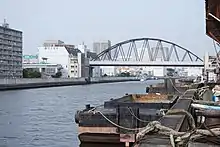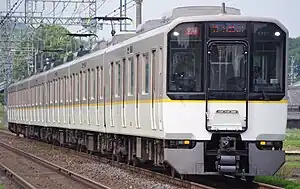| Hanshin Namba Line | |
|---|---|
 Hanshin 9000 series EMU | |
| Overview | |
| Native name | 阪神なんば線 |
| Owner | Hanshin Electric Railway Co., Ltd. Nishi-Osaka Railway Co., Ltd. |
| Locale | Osaka and Hyogo prefectures, Japan |
| Termini | |
| Stations | 11 |
| Service | |
| Type | Commuter rail |
| Operator(s) | Hanshin Electric Railway Co., Ltd. |
| Depot(s) | Amagasaki |
| Rolling stock | various EMUs (see below) |
| History | |
| Opened | January 20, 1924 |
| Technical | |
| Line length | 10.1 km (6.3 mi) |
| Number of tracks | 2 |
| Track gauge | 1,435 mm (4 ft 8+1⁄2 in) |
| Electrification | 1,500 V DC, overhead line |
The Hanshin Namba Line (阪神なんば線, Hanshin Nanba sen) is a railway line operated by the private railway operator Hanshin Electric Railway connecting Amagasaki Station in Amagasaki, Hyogo Prefecture, and Ōsaka Namba Station in Chuo-ku, Osaka, Osaka Prefecture, Japan.
History

The Dempō Line (伝法線), the predecessor of the Hanshin Namba Line, was planned as a bypass for the Hanshin Railway Main Line, and to connect from Amagasaki to Noda via Dempō. Then the plan was changed to connect to Nishikujō. The line was finally extended to Namba station in 2009.
- January 20, 1924 - The Dempō Line was opened (Daimotsu - Dempō).
- August 1, 1924 - The line was extended from Dempō to Chidoribashi.
- December 28, 1928 - The line was extended from Daimotsu to Amagasaki.
- June 1960 - The first stage of construction to extend line to Namba was started (Chidoribashi - Nishikujō).
- May 20, 1964 - The first stage of construction to extend the line to Namba was completed, thus, the line was extended from Chidoribashi to Nishikujō. The Dempo Line was renamed the Nishi-Osaka Line (西大阪線).
- September 1965 - Nishi-Osaka limited express service started.
- December 1, 1974 - Nishi-Osaka limited express service was abandoned.
- July 10, 2001 - Nishi-Osaka Railway Co., Ltd. was established to restart the extension from Nishikujō to Namba.
- October 7, 2003 - The construction of the extending line from Nishikujō to Namba was restarted.
- March 20, 2009 - The line from Nishikujō to Namba opened, and the line was renamed the Hanshin Namba Line.
Operations
There are through rapid express operations between Kobe Sannomiya on the Main Line in Kobe and Kintetsu Nara Station on the Kintetsu Nara Line in Nara via the Hanshin Namba Line, and through local, semi-express, and suburban semi-express operations between Amagasaki Station and Kintetsu Nara Station.[1][2]
- Rapid Express
- Three to five trains per hour on weekdays, and three trains per hour at weekends and holidays
- Trains stop at Kobe Sannomiya, Uozaki, Ashiya, Nishinomiya, Koshien, Amagasaki, Nishikujo, Kujo, Dome-mae, Sakuragawa, Ōsaka Namba, Kintetsu Nippombashi, Osaka Uehommachi, Tsuruhashi, Ikoma, Gakuen-mae, Yamato-Saidaiji, Shin-Omiya and Kintetsu Nara. Rapid express services also stop at Imazu and Mukogawa during the weekday offpeak, and on weekends and holidays, but pass Ashiya on weekends and holidays.
- The first 3 trains are operated from Shinkaichi Station on the Kobe Kosoku Line for Nara at weekends and holidays.[3]
- 6, 8 or 10 cars (Weekdays: 6 cars between Kobe Sannomiya and Amagasaki / weekends and holidays: many trains have 8 cars between Kobe Sannomiya and Kintetsu Nara)
- Local, semi-express, suburban semi-express
- 6 trains per hour every day[4]
- Local trains stop at every station on the Hanshin Namba Line, the Kintetsu Namba Line, and the Kitntetsu Nara Line.
- Semi-express trains stop at every station between Amagasaki and Tsuruhashi, Fuse, Kawachi-Kosaka, Higashi-Hanazono, and every station between Ishikiri and Kintetsu Nara. Suburban semi-express trains also stop at Hyotan-yama, Hiraoka and Nukata.
- 6 cars
Stations
- ● : trains stop
- | : trains pass
- Local / Suburban semi-express / Semi-express trains stop at every station on this line
| No. | Station | Japanese | Distance (km) | Train type | Connecting lines | Location | ||
|---|---|---|---|---|---|---|---|---|
| between stations |
from Amagasaki |
Rapid express | ||||||
| Rapid express trains operate to Kobe Sannomiya Station on the Main Line. | ||||||||
| HS 09 | Amagasaki | 尼崎 | - | 0.0 | ● | Amagasaki, Hyōgo | ||
| HS 08 | Daimotsu | 大物 | 0.9 | 0.9 | | | |||
| HS 49 | Dekijima | 出来島 | 1.4 | 2.3 | | | Nishiyodogawa-ku, Osaka | Osaka Prefecture | |
| HS 48 | Fuku | 福 | 1.0 | 3.3 | | | |||
| HS 47 | Dempō | 伝法 | 1.5 | 4.8 | | | Konohana-ku, Osaka | ||
| HS 46 | Chidoribashi | 千鳥橋 | 0.7 | 5.5 | | | |||
| HS 45 | Nishikujō | 西九条 | 0.8 | 6.3 | ● | |||
| HS 44 | Kujō | 九条 | 1.3 | 7.6 | ● | Nishi-ku, Osaka | ||
| HS 43 | Dome-mae | ドーム前 | 0.6 | 8.2 | ● | |||
| HS 42 | Sakuragawa | 桜川 | 0.8 | 9.0 | ● | Naniwa-ku, Osaka | ||
| HS 41 | Ōsaka Namba | 大阪難波 | 1.1 | 10.1 | ● | Chūō-ku, Osaka | ||
| Trains operate to Kintetsu Nara Station on the Nara Line. | ||||||||
Rolling stock
- Hanshin 1000 series EMU
- Hanshin 9000 series EMU
- Kintetsu 1026 series EMU
- Kintetsu 1252 series EMU
- Kintetsu 5800 series EMU
- Kintetsu 5820 series EMU
- Kintetsu 9020 series EMU
- Kintetsu 9820 series EMU
- Kintetsu 22600 series EMU (chartered trains)
.jpg.webp) Hanshin 1000 series
Hanshin 1000 series Hanshin 9000 series
Hanshin 9000 series Kintetsu 1026 series
Kintetsu 1026 series Kintetsu 1252 series
Kintetsu 1252 series Kintetsu 5800 series
Kintetsu 5800 series Kintetsu 5820 series
Kintetsu 5820 series.jpg.webp) Kintetsu 9020 series
Kintetsu 9020 series Kintetsu 22600 series
Kintetsu 22600 series
References
- ↑ 3月20日(金・祝)、阪神なんば線の開通に伴うダイヤ改正の実施! (PDF) (Press release) (in Japanese). Hanshin Electric Railway Co., Ltd. January 16, 2009. Archived from the original (PDF) on January 26, 2012. Retrieved January 18, 2009.
- ↑ 3月20日(金・祝)、阪神なんば線の開通に伴い、阪神線と近鉄線の間で、相互直通運転を開始します (PDF) (Press release) (in Japanese). Kintetsu Corporation. January 16, 2009.
- ↑ 3月20日(火・祝)、全線のダイヤ改正を実施! [Diagram Revision on Tuesday (Holiday), March 20, 2012] (PDF) (Press release) (in Japanese). Hanshin Electric Railway Co., Ltd. January 20, 2012. Retrieved January 31, 2012.
- ↑ 平成24年のダイヤ変更について [Diagram Revision in 2012] (PDF) (Press release) (in Japanese). Kintetsu Corporation. January 20, 2012. Retrieved January 31, 2012.